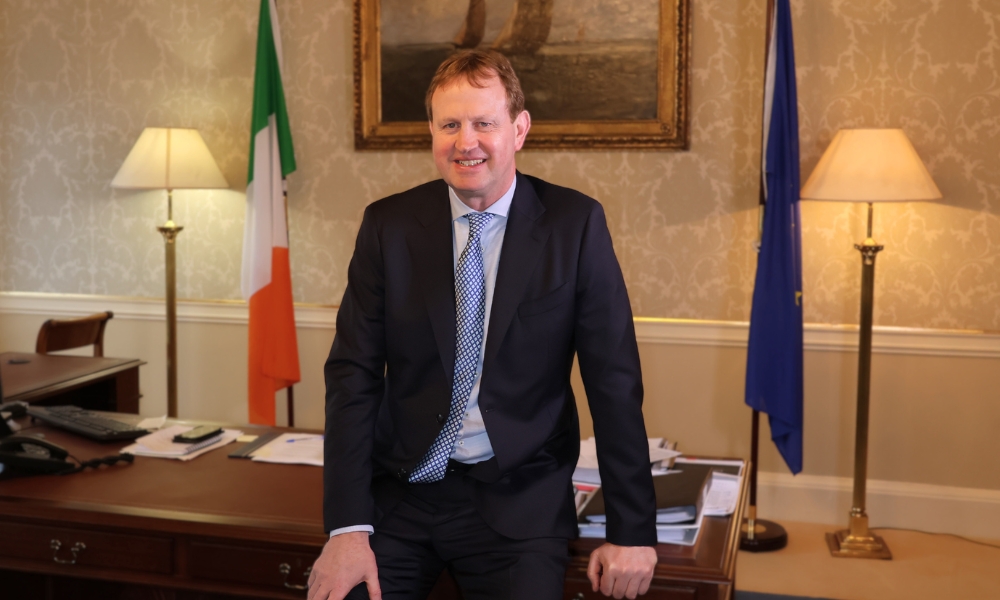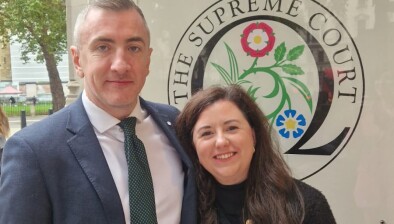Major changes to asylum, citizenship and family reunification unveiled

Jim O'Callaghan
Sweeping changes to Ireland’s migration and asylum system have been set out by the government, including significant new restrictions on family reunification rights and citizenship applications.
Most of the changes announced today concern refugees and asylum seekers, though controversial changes to family reunification will extend to all non-EEA families.
Legislation will be required to implement many of the changes and government officials say they are now developing the heads of a bill.
However, the majority of changes to family reunification — which follow a long-awaited review — “will take immediate effect”, officials say.
The Migrant Rights Centre Ireland (MRCI) has condemned the plans, which it said show ministers “clearly do not value the people who come here to work”.
However, justice, home affairs and migration minister Jim O’Callaghan said the changes were “another important step towards ensuring our migration and asylum system is rules-based and efficient”.
Among the changes for those granted international protection status is that family reunification will now only be granted in cases where it can be shown they have sufficient resources to support family members.
The period before applying for citizenship will be extended from three years to five years, bringing refugees in line with other migrants, which officials say is justified by improvements in processing times.
The criteria for citizenship will also change, with new guidance on the application of good character requirements and the introduction of a requirement that applicants are self-sufficient.
International protection applicants for citizenship must be self-sufficient and not in receipt of certain social protection payments within the previous two years before an application is made.
“My intention here is not to bar anybody who has ever received a welfare payment from the State, but I think it is reasonable to expect that a person seeking to become a citizen has contributed to the country,” Mr O’Callaghan said.
“There will be welfare payments that will not, and should not, affect a person’s ability to apply and be granted citizenship.”
Residents of international protection accommodation who are in employment will also be expected to make a financial contribution towards their accommodation, based on their income.
The scheme will be implemented within a planned 12-month period, allowing for the development of systems and resources to assess eligibility, share data securely and collect and process payments.
New powers will be introduced to revoke refugee status where a person is found to be a danger to the security of the state or has been convicted of a serious crime.
Meanwhile, an updated policy document will tighten the existing policy on family reunification for most non-EEA residents, reduce the effective waiting period for those on general employment permits, and will give permission to work for 16-18 years olds.
Mr O’Callaghan said: “These proposed changes to asylum and citizenship legislation, alongside policy measures, are another important step towards ensuring our migration and asylum system is rules-based and efficient.
“I have approached this issue with a clear overriding purpose: to ensure integrity, efficiency, and public confidence. My actions have been driven by a firm resolve to build a rules-based system that is fair to those truly in need and firm with those who attempt to exploit it.
“The changes to the international protection system will ensure that anyone who has been granted asylum here in Ireland is only permitted to avail of family reunification when they are financially self-sufficient and can provide for those they wish to bring here.
“I am also introducing the power to revoke or refuse a residence permit for a refugee in circumstances where they are found to be a danger to the security of the state or have been convicted of involvement in serious crime. Whilst these situations are rare, it is important that these powers are provided for in law.”
The updated family reunification policy will allow Irish citizens and eligible non-EEA citizens to be joined by spouses, partners and children under 18, but strict limits will be placed on other family members.
People sponsoring applications will need to demonstrate a clear financial capacity to provide for their family members if they are to be granted a permission to come to Ireland.
Applications must be made while their family members are outside the State, and an application fee will be introduced.
New conditions will also be introduced over time to ensure certain sponsors have suitable private accommodation for their family before they arrive in Ireland.
Mr O’Callaghan said: “I have always been very clear that migrants play an essential and positive role in contributing to Irish society and are vital to addressing the labour shortages in many sectors of our economy.
“The purpose of this revised policy is to balance the need to have pathways that allow people to come and work here alongside the need to ensure that those who do come here earn enough so that their family does not become a burden on the State.
“With that in mind, I have tightened eligibility requirements around family reunification to primarily include nuclear family only and to ensure the financial thresholds are realistic.”
However, the MRCI said existing family reunification rules are already too restrictive, with a 12-month waiting period prior to application, a base salary threshold to bring a spouse of €30,000, and thresholds of €44,300 and higher for bringing children.
Co-director Neil Bruton said: “The policy announced today essentially says that if you are a migrant worker in care, restaurants, or food production, you simply cannot bring your child here at all.”
He continued: “We are shocked that this new policy is more restrictive than before.
“We keep hearing this government say they value migration. This was a chance to really show that and from what we see today they clearly do not value the people who come here to work.
“People who are doing essential jobs, caring for our vulnerable, preparing our food, labouring on our farms, will continue to be kept apart from their loved ones. This is not fair and we strongly urge the minister to reconsider.”









